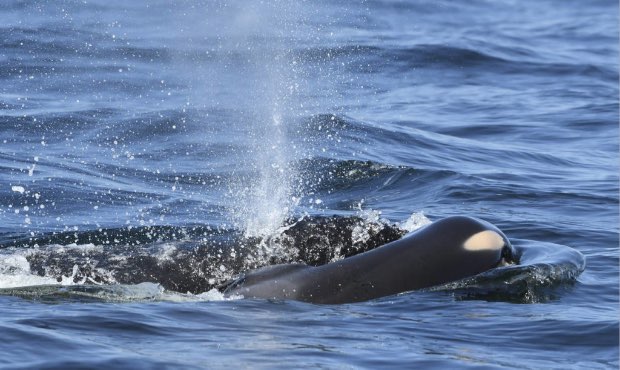forum
library
tutorial
contact

Seattle Chef's Gesture
Aims to Help Hungry Orcas
by Lynda Mapes
Seattle Times, August 22, 2018
|
the film forum library tutorial contact |

|
Seattle Chef's Gesture
by Lynda Mapes
|
With so many other local fish possibilities, it just felt wrong
to take chinook out of orcas' mouths, says the Seattle chef.
 To save more chinook salmon for starving orcas, Seattle chef Renee Erickson has taken it off the menu.
To save more chinook salmon for starving orcas, Seattle chef Renee Erickson has taken it off the menu.
Erickson, chef and co-owner of Sea Creatures, which includes Seattle restaurants The Walrus and the Carpenter and The Whale Wins, announced her decision recently to her newsletter subscribers and chefs.
It's something she has been thinking about for a while. But it was the sight of Tahlequah, the mother orca whale carrying her dead calf for 17 days for more than 1,000 miles that pushed Erickson to no longer serve chinook to her customers.
"It's sad; I love eating it, and I grew up catching it," Erickson said. But with so many other local fish possibilities, it just felt wrong to take chinook out of orcas' mouths, she said.
"The biggest gut wrench is that we have starving orcas. We are eating the salmon they need to eat."
Southern resident killer whales, the orcas of the trans-boundary waters of the Salish Sea and West Coast, rely on chinook for more than 90 percent of their diet in the summer. The big, fatty fish are in decline in Puget Sound and the Fraser and Columbia Rivers. That depletes the food supply for orcas in their primary foraging areas.
Seeing the impact on the whales, declined to only 75 members in the J, K and L pods, just became too much, Erickson said.
She said hers was a decision borne of personal reflection. "It's nothing heroic," she said, adding she is not launching a campaign for others to follow suit. Though as a leading, James Beard-award-winning chef, Erickson's influence has been felt before, including her refusal to serve farmed Atlantic salmon at her restaurants.
The southern residents face at least three struggles to survive: Too much noise in their home waters makes it harder for them to find food; toxins in their food; and lack of sufficient food add to their trouble.
"To see the effect we are having on these animals, it is too much," said Erickson. To her, laying off chinook made sense, to leave more for the whales.
With so many other good choices, from sockeye in season to local shellfish and coho, "we live so well," Erickson said.
In an October scientific paper, Rob Williams, a marine-conservation biologist based at Oceans Initiative in Seattle, a nonprofit research firm, found with his co-authors that lack of food was the biggest threat to the southern resident's survival. The whales have to have more food and less racket underwater to be able to hunt, the scientists concluded.
Williams, who works with northern and southern resident populations of orca whales, was the lead author on a paper published in PlosOne in November 2011 that found British Columbia salmon stocks in general are estimated to be at 36 percent of historical (1800s) run size, and Puget Sound stocks at 8 percent
Because southern resident killer whales specialize in eating chinook, lack of it is linked to increased mortality and reduced reproduction.
Prey intake for a lactating female can also be more than 40 percent higher than when not lactating -- so for successful reproduction, the southern residents need even more chinook.
Instead, runs continue to decline and the southern residents have not successfully reproduced in three years.
The southern resident orcas' annual need could be from 211,000 to 364,000 chinook, depending on the body size of the fish, Williams and other authors on the paper determined in their analysis.
That's enough to consider managing fish stocks with the whales' consumption in mind, under an ecologically based management scheme -- with more fish needed to boost the population to recovery, the scientists found.
One clear loser in whale recovery are the chinook themselves -- and to recover populations of the fish that are also threatened with extinction, managers need to consider the needs of a recovering orca population -- not just human fishermen, according to the scientists.
Williams said he thinks Erickson made a good decision.
"Chefs across America should think about this," Williams said.
"If everyone was moved by the sight of J35 and her calf," he said of Tahlequah, this is one thing you can do: Stop eating chinook.
"Don't buy it, don't eat it, don't serve it," Williams said of chinook. "The whales need it more than we do."
Related Sites:
Save the Orcas? We'll Have To Do This One, Radical Thing by Daniel Jack Chasan, Crosscut, 8/17/18
Orca Extinction is Not an Option by Kevin Ranker, Seattle Times, 8/14/18
Breach the Dams Now by Matt Chaney, Idaho Mountain Express, 8/13/18
learn more on topics covered in the film
see the video
read the script
learn the songs
discussion forum
